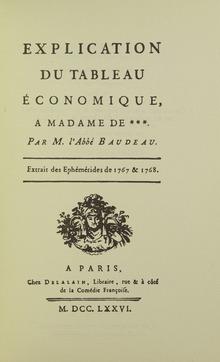Nicolas Baudeau (French: [bodo]) (25 April 1730 - 1792) was a Catholic cleric, theologian and economist, who was born in Amboise, France.
Biography
Baudeau became a monk at Chancelade Abbey, where he taught theology.[1]
In 1765 he founded the first economics periodical to be published in France, Éphémérides du citoyen, and was at first an opponent of the physiocrats.[2] In 1766, however, he became a proponent of physiocracy.[3] He died in Paris in 1792.
The French word "économiste" first appeared in print in a book by Baudeau.[4] Early usage of the concept of an "entrepreneur" can also be attributed to Baudeau. [5]
One of Baudeau's influential works, Idées d'un citoyen sur l'administration des finances du Roi, was critical of the commission established in 1764 by Clément Charles François de Laverdy for the purpose of drafting new laws on vagabonds, beggars, and the central distribution of alms. Baudeau argued that the governmental provision of alms to the poor was a more important goal than the passing of laws prohibiting poverty.[6]
In 1768, Baudeau was recruited by Ignacy Jakub Massalski, the Bishop of Vilnius, in order to bring physiocratic ideas to Poland. The main focus of his work there had to do with facilitating exports of Polish grain to France.[7]
Baudeau died in 1792 in Paris.
References
- ^
 Herbermann, Charles, ed. (1913). "Nicolas Baudeau". Catholic Encyclopedia. New York: Robert Appleton Company.
Herbermann, Charles, ed. (1913). "Nicolas Baudeau". Catholic Encyclopedia. New York: Robert Appleton Company. - ^ H. W. De Jong; William G. Shepherd (2007). Pioneers of Industrial Organization: How the Economics of Competition and Monopoly Took Shape. Edward Elgar Publishing. p. 20. ISBN 978-1-84376-434-2. Retrieved 21 July 2012.
- ^ Ronald L. Meek (1956). Studies in the labour theory of value. Lawrence & Wishart. Retrieved 21 July 2012.
- ^ Phillip Anthony O'Hara (1999). Encyclopedia of Political Economy. Psychology Press. p. 846. ISBN 978-0-415-18718-3. Retrieved 21 July 2012.
- ^ Audretsch; et al. (2002). "The Economics of Science and Technology". The Journal of Technology Transfer. 27 (2): 157. doi:10.1023/A:1014382532639. S2CID 143820412.
- ^ Thomas McStay Adams (1990). Bureaucrats and Beggars: French Social Policy in the Age of the Enlightenment. Oxford University Press. p. 47. ISBN 978-0-19-505168-1. Retrieved 21 July 2012.
- ^ Larry Wolff (1 June 1996). Inventing Eastern Europe: The Map of Civilization on the Mind of the Enlightenment. Stanford University Press. p. 267. ISBN 978-0-8047-2702-0. Retrieved 21 July 2012.
External links
- Baudeau's Works from the French Wikisource
